4 Latin America and the Caribbean
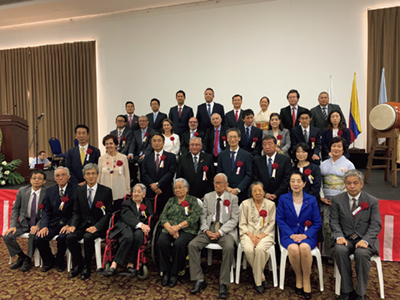
Parliamentary Vice-Minister for Foreign Affairs OMI Asako visiting Colombia and attending the Commemorative Ceremony of the 90th anniversary of Japanese immigration to Colombia (October 2019)
The Latin American and Caribbean region is an enormous market with a population of around 640 million and a regional GDP of approximately $5.5 trillion as of 2017 and is also a region of strategic importance for trade. This region has also consistently enhanced its presence in the international community through rooted democracy and as a supplier of minerals and energy resources such as iron ore, copper, silver, rare metals, crude oil, natural gas, and biofuels, as well as food resources. Although the average income level in the region is relatively high among ODA recipient countries, the region is characterized by significant disparities between the rich and the poor, as well as a large number of people who continues to suffer from poverty. Furthermore, this region has a traditionally strong personal and historical bond with Japan due to the community of Japanese immigrants and descendants (the Nikkei community) numbering more than 2 million. Japan has thus maintained stable and friendly relations with this region for a long period.
●Japan’s Efforts
Efforts Toward Disaster Risk Reduction and Environmental Issues
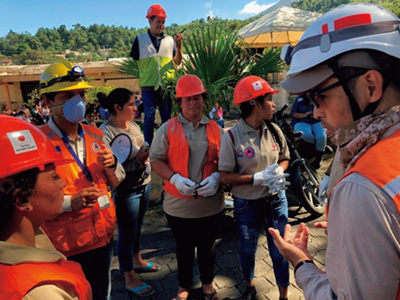
A JICA expert teaching evacuation drills to the local residents in the Pacaya volcano area in Guatemala, and community leaders for disaster risk reduction listening diligently to the expert (Photo: JICA)
While it is a region with a rich natural environment such as the tropical rainforests of the Amazon, the Latin American and Caribbean region is prone to natural disasters such as earthquakes, tsunamis, hurricanes, and volcanic eruptions. Therefore, Japan’s assistance for this region, utilizing Japan’s knowledge and experience in the field of disaster risk reduction, is of great importance. Japan has provided a cumulative total of more than $3.2 billion for reconstruction support to Haiti, which suffered catastrophic damage from the huge earthquake with a magnitude of 7.0 that occurred in 2010, as well as assistance that utilizes Japan’s expertise in the disaster risk reduction field to Caribbean countries, and countries facing the Pacific Ocean including Mexico, Peru, Chile, and Ecuador, where earthquakes frequently strike. Japan has also provided emergency relief goods to the Bahamas, which had suffered damage from hurricanes in September 2019. As for Cuba, Japan decided to provide equipment related to urban environment management such as streets and parks through a Grant Aid in 2018, which is expected to contribute to the improvement of the disaster recovery capability of the country.
In regard to Brazil, after the largest and most severe landslide disaster in the history of the country occurred in 2011, Japan implemented a comprehensive disaster risk reduction cooperation project from 2013 to 2017 with the aim of mitigating landslide risk. In the project, it offered cooperation on strengthening comprehensive disaster response capability, including identifying disaster risks, city expansion planning based on an understanding of these risks, monitoring, and transmission of information. These project activities raised Brazil’s interest in Japan’s advanced disaster risk reduction technology, and as a result, relevant personnel visited Japan in 2018 to learn about the technology of erosion control dam(Note7). Rainfall radars were also introduced in the State of Paraná in Brazil. In the Latin America and Caribbean region, where population concentration in urban areas is growing at an accelerated pace, the disaster risk reduction technology of Japanese corporations is expected to become wide-spread.
Furthermore, the Project on Capacity Development for Disaster Risk Management in Central America named “BOSAI,” which aims to share knowledge on disaster risk reduction and reduce disaster risks at the local community level, has achieved significant results in the region. Moreover, for the Caribbean countries, Japan provides support from perspectives other than those based on per capita income, as the aim is to overcome the unique vulnerabilities of small island developing states against climate change and natural disasters. In addition to developing disaster-resilient bridges and emergency communications systems, and supplying equipment that contributes to strengthening the ability to cope with disasters, Japan also dispatches flood control and soil erosion control experts, and provides technical cooperation and support for climate change measures in a wide area of eight Caribbean countries.
Moreover, Japan has been providing cooperation on a wide range of environmental issues in the region, including assistance for scientific and technological research on climate phenomena, conservation of biodiversity, broad-range evaluation of carbon dynamics(Note8) in the Amazonian forests, and construction of waste disposal facilities. In the area of renewable energy, which has been receiving wider attention in recent years, Japan provides support for introducing solar power generation in many countries, as well as for constructing geothermal power plants in Costa Rica, Bolivia, and elsewhere. In Jamaica, Japan has been implementing a project to promote the introduction of energy-saving measures through a dollar-denominated ODA loan to the country, in cooperation with the Inter-American Development Bank (IDB). Also, for the Caribbean countries, Japan contributes to promoting the sustainable use of limited marine resources by restoring fisheries facilities damaged by hurricanes, dispatching fisheries experts, and providing equipment in the fisheries field.
Cuba
Economic and Social Development Programme (Provision of garbage compactors)
Grant Aid (March 2017 - March 2020)
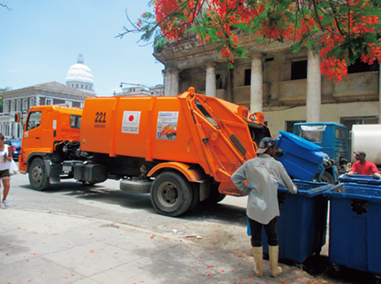
A Japanese garbage compactor provided though the project operating in Old Havana (Photo: Japan International Cooperation System (JICS))
Cuba’s capital city, Havana, has recently become a tourist destination that attracts people from all over the world, with classic cars crossing the streets of Old Havana, and its colorful colonial architecture. On the other hand, there has been a long-standing garbage issue in Havana, including Old Havana, with more than 1,800 tons of waste produced per day as of 2016. However, in the same year, the city had only 30 Chinese-made waste collection vehicles operating 24 hours a day, and they were not able to keep up with the pace of waste generation.
Against this background, Japan decided to provide Japanese-made garbage compactors through a grant aid project to solve the garbage issue in Havana, and by August 2019, all 100 vehicles arrived and were presented to Cuba. One of the features and advantages of Japanese garbage compactors is their ability to turn in a small radius, which enables them to enter the narrow alleyways of Old Havana to collect garbage. The waste collection with these Japanese garbage compactors is greatly improving Havana’s urban environment. The vehicles can be found all around the city, and are now coming to be recognized not only by residents but also by tourists. People in Havana have remarked that the garbage is being collected more often than before, the vehicles are useful not only for the garbage issue but also for measures against infectious diseases, and that city beautification is progressing thanks to the Japanese garbage compactors.
In November 2019, Havana was in a festive mood, marking the 500th anniversary of its founding. It is expected that Japan’s strong presence will be shown by making the city more beautiful through its provision of garbage compactors.
Infrastructure Development
Latin America and the Caribbean have also been drawing attention in recent years as a production base and market for industries, attracting many Japanese corporations into the region. From the perspective of developing a foundation for the economic development of Latin American and Caribbean countries, Japan is also actively engaged in developing infrastructure in the capital region and the countryside. In 2018, Japan made the decision to provide grant aid to Bolivia for the improvement of logistics and development of its domestic economy.
In addition, Japan has also worked on spreading Japan’s terrestrial digital broadcasting system (ISDB-T format) through public-private collaboration, particularly in Latin America and the Caribbean. As of December 2019, 14 countries in Latin America and the Caribbean adopted the Japanese system. Toward these countries, Japan provides support for technology transfer to enable the smooth introduction of the system, Japan also carries out human resources development to this effect.
Initiatives in the Areas of Medical Care and Sanitation, Education, and Others
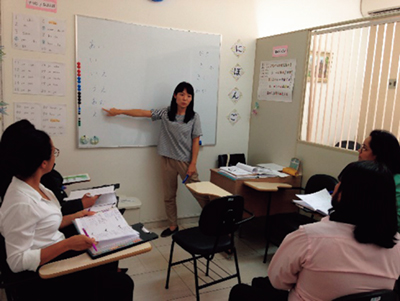
A JOCV for Nikkei communities teaching Japanese language to nurses and other staff at the Hospital Amazônia, which is a Nikkei hospital in Belém City, State of Pará, Brazil, as part of an effort to strengthen support for aging Japanese immigrant patients
Japan also provides various kinds of cooperation for Latin American and Caribbean countries in the fields of medical care and sanitation. In this region, due to the underdeveloped medical system, non-communicable diseases, infectious diseases such as HIV/AIDS and tuberculosis, and tropical diseases are still serious public health concerns. Therefore, establishing a medical system for rapid and accurate diagnosis and treatment is required. For example, virulent factors and pathological conditions for Chagas disease, a parasitic disease considered to be a serious tropical disease next to malaria in Latin America and the Caribbean, have not been elucidated. As existing therapeutic drugs have an issue of being less effective against conditions that reach the chronic phase, Japan engages in a joint research for identifying virulent factors and developing therapeutic drugs for Chagas disease in El Salvador. In the area of sanitation, Japan has conducted numerous projects to assist in the development of water and sewer systems in order to ensure the supply of safe drinking water and the recycling of domestic water. With regard to Paraguay, an Exchange of Notes was signed in 2018 for the provision of grant aid to enhance health and medical services through the supply of medical equipment.
Furthermore, “Nikkei” communities have formed in various countries in Latin America and the Caribbean. Japan has continued its efforts to support these communities such as providing support for the welfare facilities of the “Nikkei” communities, accepting trainees, and dispatching JICA Japan Overseas Cooperation Volunteers (JOCVs) (see also “Stories from the Field”).
Moreover, assistance in the field of education is extremely important for Latin American and Caribbean countries, due to the existence of poverty and insufficiencies in their educational budget. Japan has provided support for building basic educational facilities including the Project for Construction of Basic Schools in Centre and Artibonite Departments in Haiti. Japan also implemented technical cooperation projects and dispatched volunteers to improve the capacity of teachers. Such efforts are highly appreciated by the local communities.
In addition, with regard to Colombia, where a domestic conflict has been ongoing for more than half a century, Japan has provided support for peacebuilding, including removing landmines and assisting victims. While taking into account the progress of the peace process, Japan decided in June 2017 to provide a grant aid to supply equipment for the disposal of landmines, and held a ceremony to provide the equipment in November 2019 (see also the column). Furthermore, as for Jamaica, Japan signed an Exchange of Notes in 2019, concerning a grant aid for the provision of a patrol boat to crack down on illegal fishing operations and illegal inflows of drugs and firearms through sea routes.
Ecuador
Math Olympics held at Elementary Schools in Quito
JICA Volunteer Program (Senior Volunteers) [Primary School Education] (January 2016 - January 2019)
In June 2018, the Quito City Math Olympics was held for the first time, with participation of 3rd to 7th grade elementary school students, in cooperation with the education bureau of Quito City, Ecuador’s capital, nine of the city’s elementary schools and the JICA Ecuador Office. All students of the nine schools, totaling 5,699, participated in the preliminary round, and the representatives from each school, totaling 320, participated in the finals.
It all started a year and a half earlier, right after Mr. SATO Daisuke, a JICA Senior Volunteer, began his assignment in Ecuador. An officer of the Quito Education Bureau requested him to hold a Math Olympics in the city to motivate students to study mathematics. Mr. Sato did not, however, immediately respond to Quito City’s request because he believed that the highest priority for motivating students was to elaborate and improve the teaching methods. He first conducted a total of 60 research classes at nine elementary schools in Quito City, and after feeling that the classes had become more fruitful, he decided that it was time to hold the Math Olympics.
The questions at the competition were created after in-depth discussions with other volunteer members in the education sector. They chose basic questions for the preliminary round and advanced ones for the finals that test children’s ability to tackle practical questions. The time duration for the final stage examination of certain grades was 75 minutes, which was almost 35 minutes longer than their ordinary classes. This was quite challenging for maintaining concentration, but every child worked hard to focus on the questions. Mr. Sato said that it made him feel reassured that the children’s learning attitudes and motivation were gradually changing.
In addition, the competition provided individual awards at the finals and group awards based on the preliminary round so as to let all children feel good about participating. At the award ceremony, there were bright smiles on the faces of not only the award-winning children but also their mathematics teachers.
Some advanced students earned higher scores than expected. The education bureau of Quito City intends to continue the Math Olympics, and in fact, the 2nd Math Olympics were held in June 2019. This event is expected to lead to the improvement of education in the country.
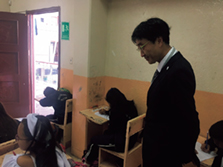
Mr. Sato at the occasion of the Math Olympics (preliminary round) (Photo: JICA)
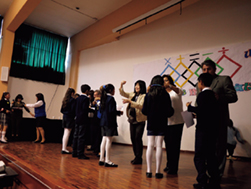
The award ceremony (the Math Olympics logo is on the back wall) (Photo: JICA)
South-South Cooperation and Cooperation with Regional Organizations
Thanks to Japan’s continuous efforts at development cooperation over many years, Brazil, Mexico, Chile, and Argentina have obtained the capacity to assist other countries, and achieved results in South-South cooperation.* Furthermore, Japan has signed partnership programs with these countries. For example, based on such partnerships, Japan is collaborating with Argentina to provide assistance to small and medium-sized enterprises (SMEs) in Latin America, as well as in Africa. In Chile, Japan is conducting human resources development programs through triangular cooperation in the field of disaster risk reduction, and has trained 4,669 people, which exceeded the initial target of 4,000. In Brazil, with many years of cooperation from Japan, the Japanese-style community policing system has become wide-spread. Utilizing this experience regarding the community policing system, and based on the framework of triangular cooperation, Brazilian experts in the field of community policing are currently dispatched to Central American countries to conduct technology transfers.
Furthermore, Japan is also cooperating with the Central American Integration System (SICA), the Caribbean Community (CARICOM), and other regional organizations to formulate projects that cover the entire region, in order to achieve a more effective and efficient development cooperation related to development issues that are shared throughout the Latin American and Caribbean region.
Assistance for Venezuelan Refugees and Migrants
Due to the recent deterioration of the economic and social conditions in Venezuela, approximately 4.8 million Venezuelan refugees and migrants have flowed to neighboring countries as of December 2019. This has caused the deterioration of the living conditions of local residents in the areas that received refugees and migrants and instability. The fact that the situation has not been dealt with sufficiently has become a challenge. With regard to Brazil and Colombia, Japan exchanged notes on a grant aid for enhancing the system of registration and protection of refugees and migrants upon entering the country, in cooperation with the United Nations High Commissioner for Refugees (UNHCR) and the International Organization for Migration (IOM), in June and July 2019 respectively. With regard to Ecuador, through cooperation with the World Food Programme (WFP), Japan exchanged notes in November 2019 for a grant aid to supply food (flour, corn flour, rice, vegetable oil, etc.).
- *South-South cooperation (Triangular cooperation)
- South-South cooperation refers to cooperation provided by relatively advanced developing countries to other developing countries, utilizing their experiences and their own human resources. In many cases, the cooperation, primarily technical cooperation, is conducted in countries that have similar natural environments and cultural and economic circumstances, and/or facing similar development processes. Support by donors or international organizations for such cooperation between developing countries is referred to as “triangular cooperation.”
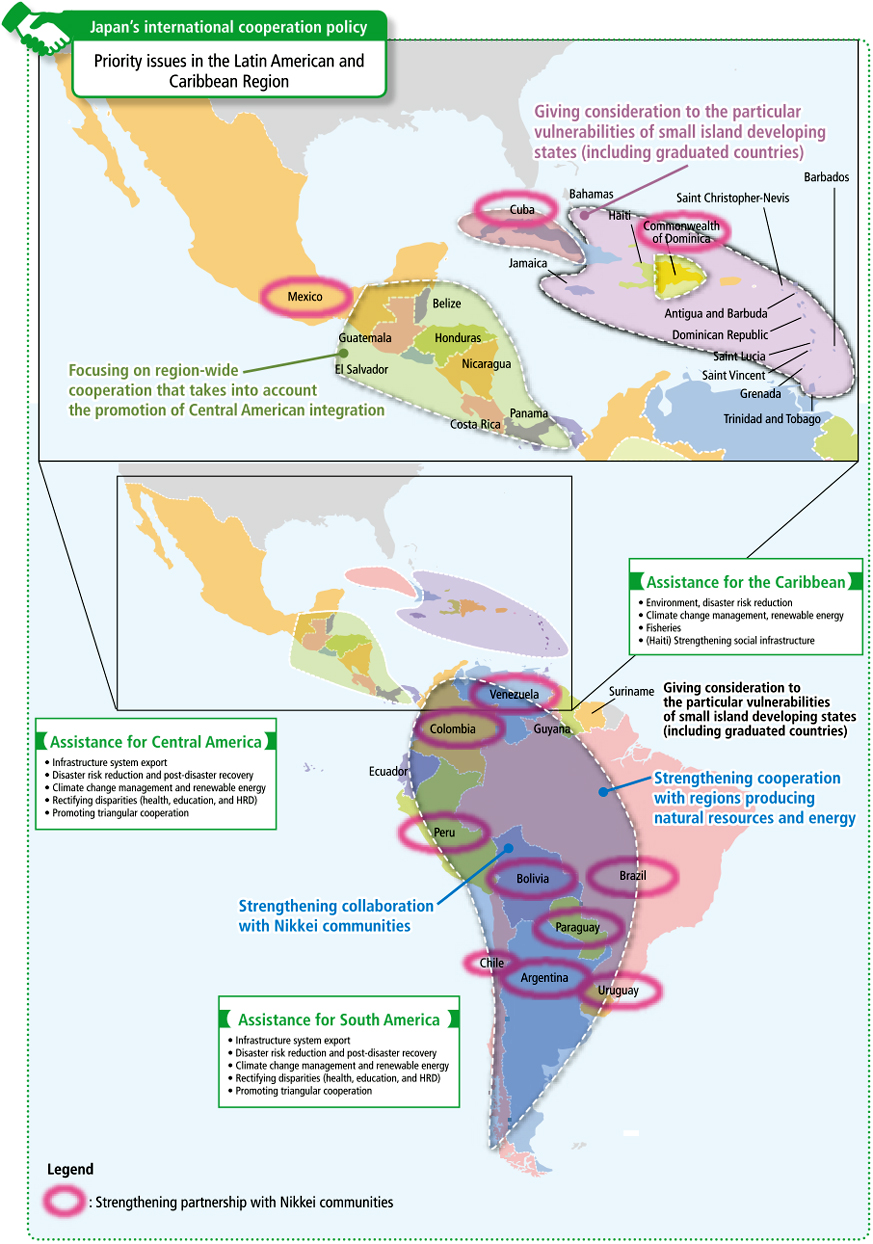
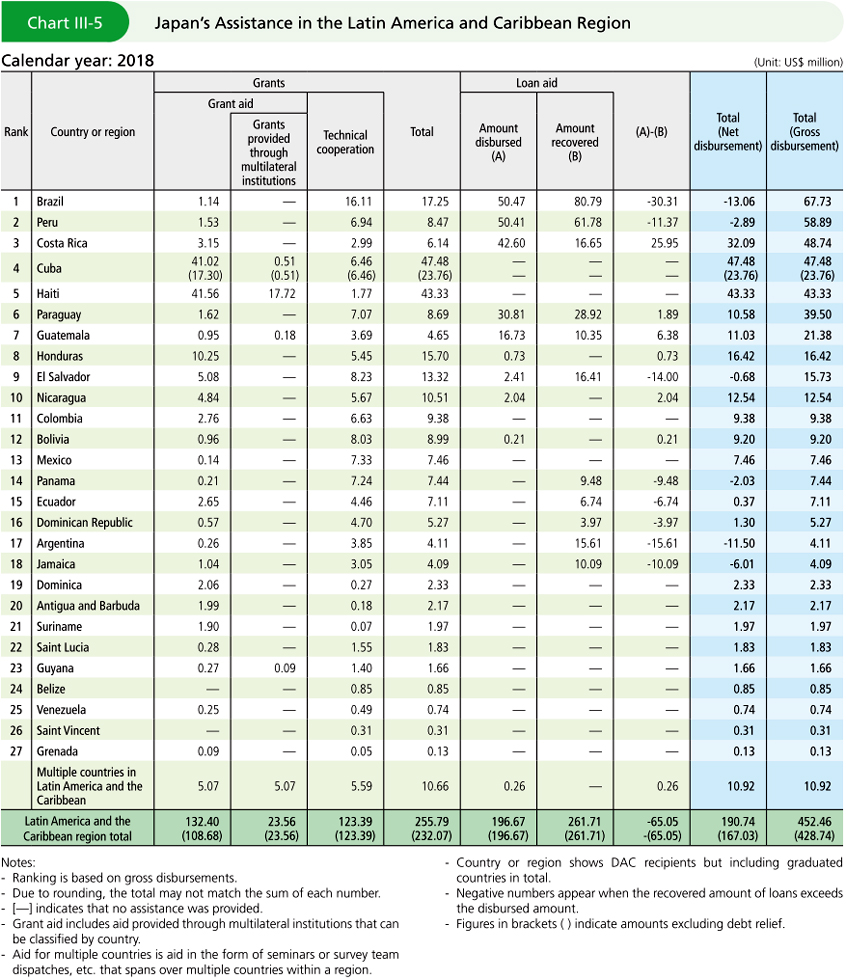
- Note7: Technology that enables the amount of sediment flowing downstream to be adjusted by stopping harmful sediment that flows from upstream, such as debris flow, and releasing the accumulated sediment little by little. Earth and sand are accumulated on the erosion control dam, which will make the slope of the river gentle and prevent the riverbed and riverbanks from being scraped, while it will also work for weakening the destructive power of the sediment flow and functioning to prevent the slope of the mountain from collapsing. (Source: Website of Nikko Sabo Office, Kanto Regional Development Bureau, Ministry of Land, Infrastructure, Transport and Tourism: http://www.ktr.mlit.go.jp/nikko/nikko00005.html) (in Japanese only)
- Note8: Changes in the amount of carbon in a given period.
